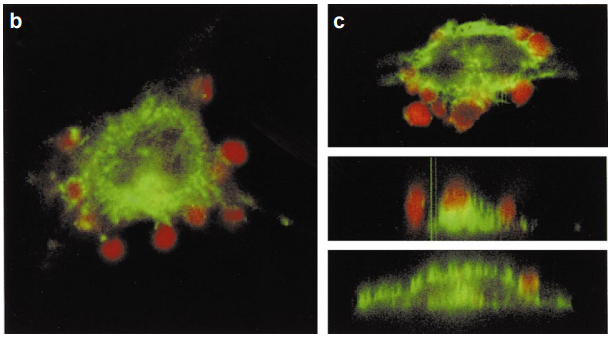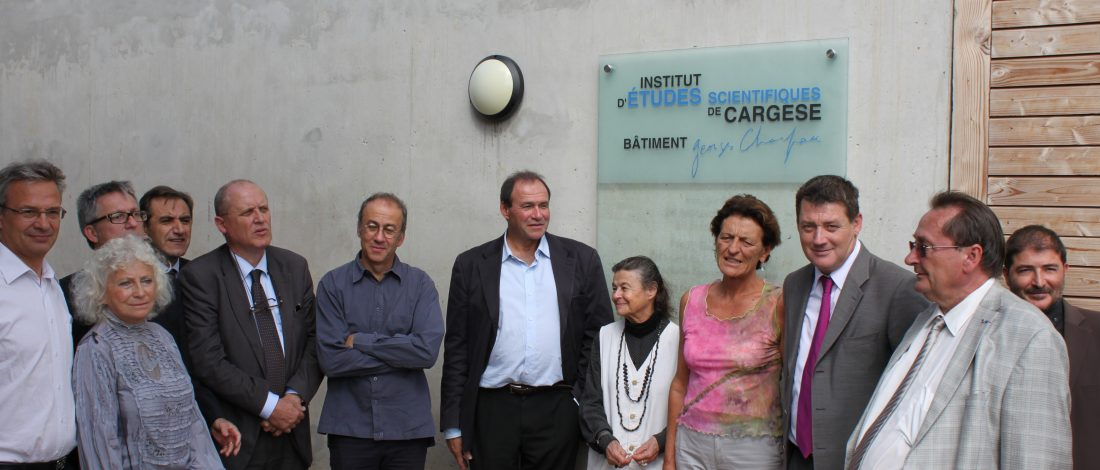AN INTERNATIONAL INNOVATOR
From identifying the complexity of the mammalian lipid ABC transporters and their role in immunity to developing BIOTRAIL, the AMIDEX international interdisciplinary program in Life Sciences, the pioneer Giovanna Chimini has been a team leader at the CIML from 1992 to 2010 and is now Associate Dean in charge of Research and International Relations at the Faculty of Sciences, Aix-Marseille University. In December 2018, she was honored with the Palmes Académiques award with the rank of Chevalier from the Ministry of Education, award that recognizes distinguished scholars for their talents and exemplary activities in education.
From blazing her first trail in the field of the ABC (ATP-Binding Cassette) membrane transporters where Giovanna Chimini and her team pointed out its complexity in mammalian systems
The cell membrane is a very dynamic structure in which its main components, the lipids, the proteins and their carbohydrates groups are in constant movement. This molecular fluidity explains the complexity by which the membrane can receive and transport signals in and out the cell, thus enabling a wide range of biological processes. Transport of most hydrophilic substrates across the hydrophobic biological membrane is directly mediated by various transmembrane transport proteins. The identification and classification of these transporters as well as their substrate specificities are an important challenge in functional biology and human pathologies. Giovanna Chimini and her team defined in the early ‘90s the complexity and structural diversity of the ABC transporters in mammals and cloned and mapped many of the ABC transporter genes in mice and humans, among them the ABCA1 and ABCA2 genes located on chromosome 9. This work opened the realm of possible functions for these newly-discovered transporter proteins, not only expressed on the plasma membrane but also on the Golgi apparatus and on specific vesicles. Giovanna Chimini and her team showed that ABC1 promotes the phagocytosis of apoptotic cells by macrophages. They also showed that ABCA1, being a key protein in cholesterol transport, drives lipid efflux to apolipoprotein A-1, mediates HDL particle formation and that ABC1 enhances macrophage anti-inflammatory function, thus preventing atherosclerosis.

ABC1-expressing cells acquire the ability to engulf apoptotic thymocytes. Confocal microscopic analysis of XY (b, c, upper panel) and XZ (c, middle and lower panels) sections, verifying that cell corpses (apoptotic thymocytes, stained in red by 7-AAD) are engulfed.
Copyright: Giovanna Chimini, CIML
Today the trained physician and accomplished scientist continues to advance fundamental research to better understand the etiopathogenic mechanisms of human diseases. With international collaborators, Giovanna Chimini is continuing her quest to unravel how ABC1 impacts the intrinsic membrane plasticity by using cutting-edges techniques at the cross between biology and physics and how ABC1 impacts the process of inflammation in colon cancer, atherosclerosis and malaria.
to blazing the trail of the “jardin des savants” at the Institut d’Études Scientifiques de Cargèse (IESC),
This Institute started in Cargèse, Corsica, in the 60’s as an independent nonprofit association to facilitate exchange between distinguished scientists, mainly physicists, in a non-formal setting. Now affiliated with the universities of Corsica and Nice Sophia-Antipolis and with the CNRS (Centre National de la Recherche Scientifique) as an UMS (Unité Mixte de Service), the UMS 820 aims to train and disseminate the scientific culture through a series of prestigious training programs, conferences and workshops in a wide range of disciplines. Giovanna Chimini was the Director of the Institute from 2008 to 2018, extending its notoriety as an institution of academic excellence with a multidisciplinary approach. Through an extensive scientific watch, her team was able to bring together eminent scientists from rising fields to facilitate the exchange of ideas that lead to the development of partnerships of outstanding quality such as the one with the Institut Henri Poincaré. As a result of its success, the Institute became too small to accommodate the growing number of participants. Giovanna Chimini and her team assumed the responsibility for bringing to completion the improvement and development of onsite facilities. Both renovation and additions were implemented to optimize energy consumption in an environmental-friendly manner. The zero net energy structure, the George Charpak building, was inaugurated in 2012 and named after the Nobel price recipient who was one of the early contributors to the Institute.

Inauguration of the Georges Charpak building in September 2012.
Copyright: IESC
To further cultivate the exclusive intellectual exchange that originally lead to the conception of the Charpak building, Giovanna Chimini mandated the internationally renowned gardener-landscaper Gilles Clément to design a sustainable garden, the “jardin des savants”. The accomplishment of this garden will further facilitate the budding of ideas and concepts across disciplines, thus perpetuating the Institute’s culture.
and the internationalization and partnerships trails of the Faculty of Sciences at the University of Aix-Marseille under the trusteeship of the CIML,
To further increase her commitment to the transmission of knowledge across disciplines, scientific entities and countries, Giovanna Chimini and her team developed and coordinated an institutional partnership program with Sanofi and Sanofi Pasteur and an international exchange program for students with Harvard Medical School, USA. The latter supported the implementation of the international academic program BIOTRAIL, a certified AMIDEX program linked to the M.S. in Immunology. Recognizing her commitment to increase student’s experience outside the academics and abroad, Giovanna Chimini was named Associate Dean for Research and International Relations in 2016.
the marks of Giovanna Chimini and her teams will remain to inspire and guide many generations of future students and scientists. Her advice “to travel and open your mind …….. to exchange while reaffirming human values …….. while preserving our environment” are heartfelt. Her intellectual richness, openness of mind and commitment to the collective advancement of science are truly motivating.